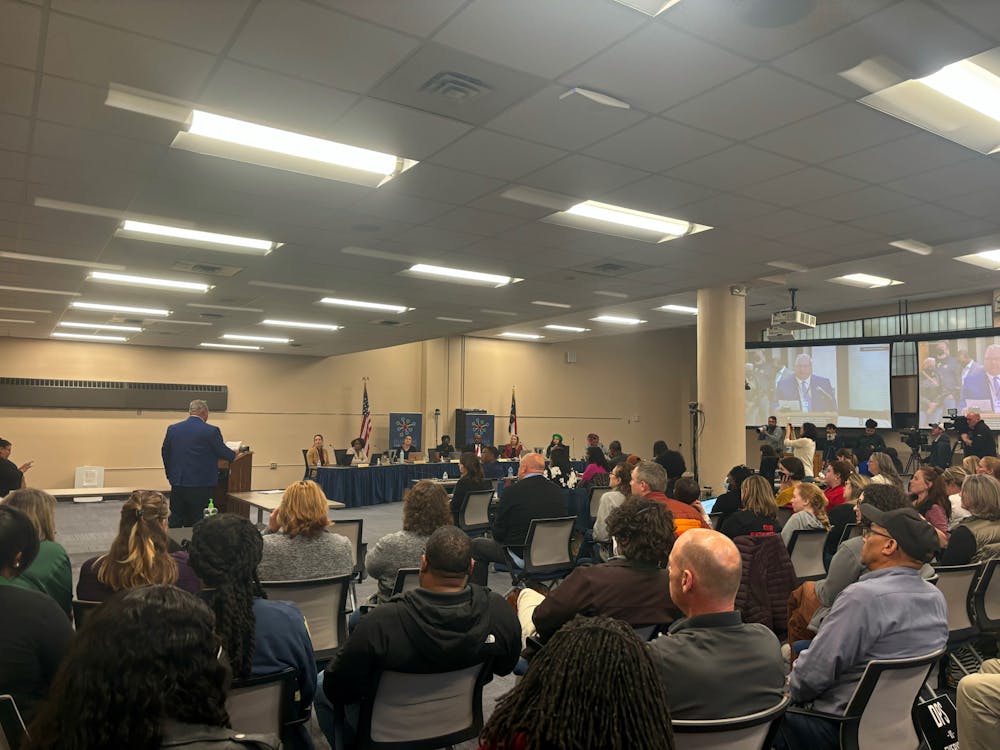The Durham Public Schools Board of Education was unable to come to a resolution on the ongoing pay dispute during its latest meeting, opting to table the issue until next week.
The DPS Board of Education met Friday at the Minnie M. Forte-Brown Staff Development Center to discuss a “payroll error” that affected 1,300 employees. Workers are upset after pay cuts were announced in January, after the district overpaid some workers due to what was originally classified as an accounting error. Teachers and classified staff participated in walkouts and protests in the weeks leading up to Friday to express their dissatisfaction with the response from DPS, demanding transparency and accountability from the district.
“People deserve to be mad that DPS took away the salaries that made DPS a competitive employer,” said DPS occupational therapist Molly Bagby during the meeting.
Though the board did not decide on the salary dispute, they unanimously passed a motion to terminate their contract with HIL Consultants and hire Kerry Crutchfield as an independent comptroller to assist Rod Malone, the board’s attorney, in an investigation into how the error occurred.
Raises revoked
In October 2023, the district implemented findings from an employee compensation study conducted in January 2023 by HIL Consultants, which determined how to distribute raises, bringing employee salaries up to market rates. On Jan. 12, 2024, the district revoked the raises, claiming that an accounting issue led to many workers being paid more than intended.
“I came to DPS in 2008 with 24 years of outside experience, and [those] 24 years enabled me to get my job. It was valued, and now it’s nothing,” said Donna Hamm, manager of the DPS records department.
DPS salaries are organized by “grades,” which refer to job type, and “steps,” which denote years of experience. Typically, steps have been attributed in a one-to-one ratio — one step for one year of experience. However, in January DPS explained that experience outside of the district would no longer be counted, meaning that any work out of state or in the private sector would not factor into step determination.
“I’ve only been [in the district] one year. I have 33 years of experience. I am now at step one,” said Heidi Jo Hetland, a DPS physical therapist.
The district claims that the switch does not constitute a policy change, but rather that outside experience was never meant to contribute to employees’ steps.
Alvera Lesane, assistant superintendent of human resources, cited several other districts in North Carolina that calculate steps in a similar way. Lesane pointed to the Wake County Public School System as an example of such a district, noting that the county does not grant external or non-state experience for classified workers except for select positions.
Lesane justified this policy by highlighting the district’s ongoing financial difficulties, which have been a running theme throughout the dispute and served as the impetus for the salary changes in the first place.
“The majority of school districts in North Carolina do not recognize external non-state experience because they don’t have the resources to do so,” she said.
The Friday board meeting
The meeting began at 3 p.m. with a closed session that stretched well past the one-hour mark, giving board members the chance to discuss “confidential personnel matters” and consult with their attorney.
The closed session was objected to by one audience member, who cited Chapter 143, Article 33C, Subsection A of the North Carolina General Statutes.
According to the regulation, “each official meeting of a public body shall be open to the public,” where a “public body” refers to “any elected or appointed authority, board, commission, committee, council, or other body of the State.”
The legality of a specially-called closed session before the regular board meeting on Jan. 31 was previously called into question on the same grounds.
When the board reconvened at 4:40 p.m., Chair Bettina Umstead presented two options for addressing salary complaints.
The first option involved continuing with the HIL compensation study’s salary schedule, under which worker experience would be limited to in-district years. Worker compensation would remain at the same level as the January adjustments dictated, providing employees with a minimum 4% salary increase over the 2022-23 rates.
The second option would eliminate the study’s influence and restore the 2022-23 salary steps, providing classified employees with an 11% increase over the 2022-23 rates. However, the raise distribution would be far more unequal, with some employees receiving wages lower than those listed in the January email to employees.
“You are asking us and these people who have put their blood into their jobs for our children to accept a budget that you successfully came up within a week and a half while the house was on fire, but [you] couldn’t come up with a budget during normal times,” said Kristina Baldridge, the parent teacher association president at Forest View Elementary School. “How do we trust that the nonsense you just shared in two slides is something that we can move forward with and protect this district?”
The board only presented two of the five options originally considered, as these two plans were the only approaches that would remain within the budget as approved on June 12, 2023.
“You gave us market value, and then you revoked it,” said one DPS worker at the meeting. “Financial stewardship is not possible in light of the district missteps, especially when it falls on the shoulders of those who are being mistreated.”
Fiscal responsibility was identified as a key DPS priority.
“This should have been a conversation for us to have privately,” said DPS Superintendent Pascal Mubenga. “I’m not going to put an option there that’s going to cost money that we do not have the compensation for.”
A public comment period followed, during which time dozens of teachers, classified workers, parents and supportive community members advocated for appropriate compensation and increased transparency from the district.
“Every day it’s another disrespectful idea from you and the executors. You gotta pay what you promised,” said Brian Calloway, a former DPS maintenance worker.
A sticking point for DPS employees present at the meeting was the fact that the alternative plans to address the salary dispute without cutting employee pay would require $3 million in additional funding.
The district currently has an estimated $6.4 million in available fund balance after transferring $4.5 million to workers to cover January paychecks, though Umstead noted that it is recommended to retain at least 8% of the budget, or one month’s operating expenses, which for DPS amounts to $12.7 million.
“It’s going to cost you a lot more than $3 million if you go against your word,” Calloway said.
While many DPS workers showed up to advocate for themselves and their colleagues, one DPS employee noted that others were dissuaded by employer intimidation.
“I’m also speaking for multiple other departments where those employees have said their supervisors, principals, and directors have said, ‘Don’t speak. Stay quiet. Don’t make a scene.’ There are some that have even threatened to write up employees if they’re making a scene and speaking out. Are y’all really okay with management by intimidation?” asked physical therapist Christie Clem.
Ultimately, stakeholder comments boiled down to one common message: “Find the money.”
Moving Forward
DPS employees at the meeting were left unsatisfied by the board’s approach, particularly with the rushed timeline that hampered their ability to prepare comments, limited options presented to address the issue that many audience members deemed inadequate and lack of movement on the issue at the meeting’s end.
“DPS staff are unwilling to put up with more disrespect. If demands are not met — no unilateral pay cuts, no restoration of steps, and a meet-and-confer policy — worker protests are likely to continue,” said Durham Association of Educators President Symone Kiddoo during the public comment period.
The DAE Organizing Committee, a group of union members from across the district, met Saturday morning to determine a response to the board’s decision. They resolved to continue employee demonstrations, beginning with a “Day of Protest” Monday.
“These workers made life-altering decisions based on those raises that they cannot undo,” reads a statement from the DAE Instagram page. “Now, they worry if they will be able to pay their bills and feed their families when they get their February paycheck in a few short weeks.”
The teachers’ union clarified three primary worker demands moving forward. First, they said that the Board of Education should restore workers’ previous steps and commit to no pay cuts for February’s paychecks. Second, the union is demanding a public explanation as to why the January paychecks did not reflect expected salaries. Third, they are asking the board to schedule a “Meet-and-Confer” work session with the DAE for next week, which the board agreed to do at the end of last Friday’s meeting.
“District employees have lost trust in the DPS administration, and remain frustrated by the lack of transparency with the district’s finances. What DPS can afford to pay its employees going forward remains a mystery,” the DAE statement reads.
Monday’s protest is set to involve an “overwhelming majority” of staff from several schools, including Carrington Middle, Durham School of the Arts, Little River Elementary, Morehead Montessori, Sandy Ridge Elementary, EK Powe Elementary and Bethesda Elementary. The union expects DPS officials to close the schools in response to the staffing shortages.
The next Board of Education meeting is scheduled for Feb. 8. The board is expected to decide on the payroll matter with a priority placed on ensuring February’s paychecks go out on time.
Get The Chronicle straight to your inbox
Signup for our weekly newsletter. Cancel at any time.

Zoe Kolenovsky is a Trinity sophomore and news editor of The Chronicle's 120th volume.

